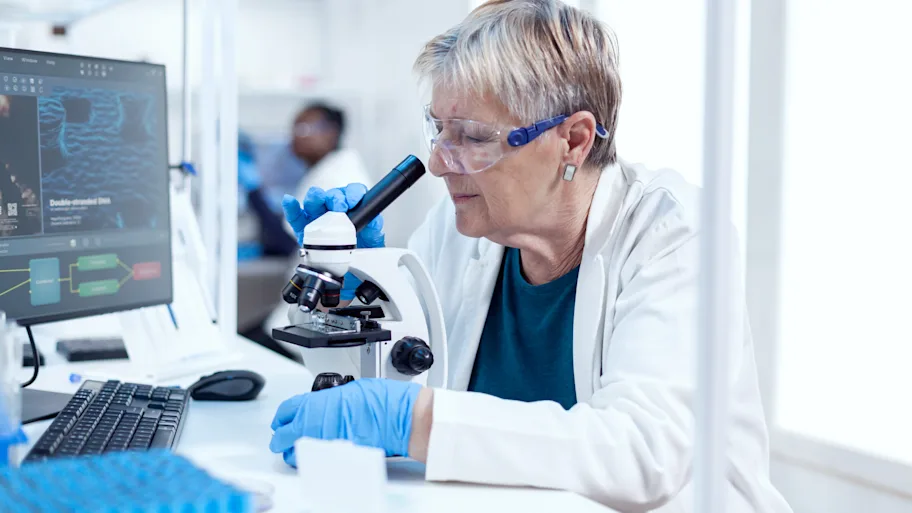
- Science news
- Research Topics
- Breast cancer breakthroughs: five Research Topics advancing early detection and treatment
Breast cancer breakthroughs: five Research Topics advancing early detection and treatment

In 2022, 2.3 million women worldwide were diagnosed with breast cancer, and 670,000 lost their lives to the disease. While gender and age are primary risk factors, the reality is that half of all breast cancer cases occur in women without any other identifiable risk factors.
However, disparities in breast cancer outcomes still persist. Women in high-income countries have a 60% higher survival rate compared to those in low- and middle-income regions. The gap is largely due to challenges in accessing early detection, timely diagnosis, and comprehensive treatment in resource-limited settings.
This October, we join the World Health Organization (WHO) in raising awareness about the urgent need to take action against breast cancer. WHO aims to reduce breast cancer mortality by 2.5% annually by 2040 – potentially saving 2.5 million lives – through three key pillars:
promoting early detection
ensuring timely diagnosis
providing comprehensive breast cancer management.
With early intervention as a focal step for effective treatment and improved results, we've chosen five Research Topics advancing cancer science focused on developing innovative, evidence-based approaches to address this global health issue.
All articles are openly available to view and download.
1 | Reviews in Breast Cancer
75.900 views | 20 articles
Female breast cancer (BC) has surpassed lung cancer, and today, it is the most diagnosed type of cancer (2.3 million new cancer cases, representing 11.7% of all cancer cases). In terms of mortality, it ranks in 5th place, with 685,000 deaths in 2020. For women, BC represents 1 in 4 cancer cases and accounts for 1 in 6 cancer deaths.
In this Research Topic, scientists bring state-of-the-art research in breast cancer to light, including:
prognostic and potential therapeutic factors, such as immune cells in the tumor microenvironment, inflammations, small extracellular vesicles, RNA binding proteins, and dysbiosis
social factors like the risk of anxiety, depression, and sexual dysfunction, as well as health-related quality of life in BC patients
the effects of tobacco smoking and breast cancer risk
the role of artificial intelligence (AI) in diagnosis
educational tools to improve radiologists’ performance when detecting this disease.
2 | Diagnostic, Prognostic and Predictive Factors of Response in the Era of Precision Oncology in Breast Cancer
76.700 views | 33 articles
This Research Topic explores the state-of-the-art recapitulations, insights, and future perspectives in the field of molecular prognostic and predictive biomarkers of response in breast tumors, including:
novel studies regarding the discovery, preliminarily or definitive validation of molecular diagnostic and prognostic tools
predictive biomarkers of response to targeted therapeutics in breast cancer.
Despite progress in cancer genomics, challenges such as costs, technical difficulties, and limited knowledge have restricted precision oncology to certain countries and institutions as well as to relatively limited diagnostic and therapeutic scenarios.
Research is still needed for a personalized and molecularly driven approach to breast cancer treatment. For this reason, this topic focuses on cutting-edge research that could lead to advancements in breast cancer's molecular diagnosis and therapeutics.
3 | AI Applications for Diagnosis of Breast Cancer
46.900 views | 22 articles
This Research Topic centers attention on breast cancer diagnosis using medical image analysis and classification to improve the early diagnosis of breast cancer and screening techniques. It also examines current AI methodological, practical frameworks, methods, and tools for efficient AI-based applications for breast cancer diagnosis.
AI is rapidly gaining utility in the health sector, such as diagnosing various cancers. There are advantages to using these techniques, for example:
imitating human decision-making with superior performance
end-to-end learning scheme with integrated feature learning
handling complex and multi-dimensional data
making clinical data available from various high-throughput experiments.
4 | Pharmaceutically Targeting Hypoxia in the Breast Cancer Microenvironment: Mechanistic and Translational Approaches
34.700 views | 10 articles
This topic describes current trends and advances in drug therapies and delivery systems targeting hypoxia in the tumor microenvironment of breast cancers. This community of scientists also presents significant physicochemical changes and signaling pathways activated in the hypoxic breast cancer microenvironments.
This Research Topic showcases various breast cancer treatment strategies, including approaches to develop hypoxia-targeted drug delivery systems and translational approaches to pharmaceutically treating breast cancers.
5 | Novel Immune Markers and Predictive Models for Immunotherapy and Prognosis in Breast and Gynecological Cancers
32.000 views | 16 articles
This Research Topic discusses the latest novel immune markers and predictive models related to immunotherapy response and prognosis of patients with breast and gynecological cancers.
Researchers have studied predictors from the immune microenvironment, tumor genome, and liquid biopsies for cancer immunotherapy. They have also identified immune markers to select appropriate treatments and monitor efficacy and recurrence.
However, there is no standardized protocol for their clinical application, making this topic highly impactful for developing novel predictive models by rational design and formulating combination strategies for cancer immunotherapy and patients’ prognosis.






